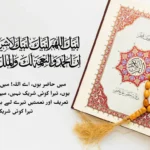The phrase Kun Faya Kun (كُن فَيَكُون), meaning Be, and it is, epitomizes the unparalleled power of Allah to create and command. This profound expression appears in various places in the Quran, demonstrating Allah’s absolute authority over creation, life, and existence. Let us explore the significance of Kun Faya Kun by analyzing the Quranic verses where it is mentioned, along with their Arabic text and translations in English and Urdu.
| Iyyaka Na’budu Wa Iyyaka Nastaeen |
| Radhitu Billahi Rabba Wabil Islami Dina |
| Astaghfar Dua: Meaning, Benefits & How to Recite |
| dua ahad- دعاء العهد |
1. Surah Al-Baqarah (2:117)
Arabic:
بَدِيعُ السَّمَاوَاتِ وَالْأَرْضِ وَإِذَا قَضَى أَمْرًا فَإِنَّمَا يَقُولُ لَهُ كُنْ فَيَكُونُ
English Translation: “The Originator of the heavens and the earth. When He decrees a matter, He only says to it, ‘Be,’ and it is.”
Urdu Translation:
“وہ آسمانوں اور زمین کا خالق ہے، جب وہ کسی معاملے کا فیصلہ کرتا ہے تو اسے کہتا ہے ‘ہو جا‘ اور وہ ہو جاتا ہے۔”
This verse underscores Allah as the unparalleled Creator who merely commands, and things come into existence.
2. Surah Al-Imran (3:47)
Arabic:
قَالَتْ رَبِّ أَنَّىٰ يَكُونُ لِي وَلَدٌ وَلَمْ يَمْسَسْنِي بَشَرٌ ۖ قَالَ كَذَٰلِكِ اللَّهُ يَخْلُقُ مَا يَشَاءُ ۚ إِذَا قَضَىٰ أَمْرًا فَإِنَّمَا يَقُولُ لَهُ كُنْ فَيَكُونُ
English Translation: “She said, ‘My Lord, how will I have a child when no man has touched me?’ [The angel] said, ‘Such is Allah; He creates what He wills. When He decrees a matter, He only says to it, ‘Be,’ and it is.”
Urdu Translation: “
انہوں نے عرض کی، ‘میرے ربّ! مجھے بچہ کیسے ہو سکتا ہے جب مجھے کسی مرد نے نہیں چھوا؟’ فرمایا، ‘اللہ جو چاہے وہ پیدا کرتے ہیں، جب وہ کسی فیصلے کا ارادہ کرتے ہیں تو اسے کہتا ہے ‘ہو جا‘ اور وہ ہو جاتا ہے۔”
This verse highlights the miraculous creation of Prophet Isa (Jesus, peace be upon him), emphasizing Allah’s will as the ultimate cause.
3. Surah Al-Imran (3:59)
Arabic:
إِنَّ مَثَلَ عِيسَىٰ عِندَ اللَّهِ كَمَثَلِ آدَمَ ۖ خَلَقَهُ مِنْ تُرَابٍ ثُمَّ قَالَ لَهُ كُنْ فَيَكُونُ
English Translation: “Indeed, the example of Jesus to Allah is like that of Adam. He created him from dust; then He said to him, ‘Be,’ and he was.”
Urdu Translation: “
بے شک عیسیٰ کی مثال اللہ کے نزدیک آدم کی طرح ہے۔ انہیں مٹی سے پیدا کیا، پھر کہا ‘ہو جا‘ اور وہ ہو گئے۔”
This verse draws a parallel between the creation of Prophet Adam and Prophet Isa (peace be upon them), both exemplifying Allah’s power.
4. Surah An-Nahl (16:40)
Arabic:
إِنَّمَا قَوْلُنَا لِشَيْءٍ إِذَا أَرَدْنَاهُ أَنْ نَقُولَ لَهُ كُنْ فَيَكُونُ
English Translation: “For whenever We intend a thing, We only say to it, ‘Be,’ and it is.”
Urdu Translation:
“جب ہم کسی چیز کا ارادہ کرتے ہیں تو ہم صرف یہ کہتے ہیں ‘ہو جا‘ اور وہ ہو جاتی ہے۔”
This verse reaffirms Allah’s effortless ability to bring anything into existence.
5. Surah Maryam (19:35)
Arabic:
مَا كَانَ لِلَّهِ أَنْ يَتَّخِذَ مِنْ وَلَدٍ سُبْحَانَهُ ۚ إِذَا قَضَىٰ أَمْرًا فَإِنَّمَا يَقُولُ لَهُ كُنْ فَيَكُونُ
English Translation: “It is not [befitting] for Allah to take a son; exalted is He. When He decrees a matter, He only says to it, ‘Be,’ and it is.”
Urdu Translation:
“اللہ کے لیے مناسب نہیں کہ وہ کسی کو بیٹا بنائے۔ پاک ہے وہ، جب وہ کسی امر کا فیصلہ کرتا ہے تو اسے کہتا ہے ‘ہو جا‘ اور وہ ہو جاتا ہے۔”
This verse negates the notion of Allah having a son, affirming His transcendence and power.
6. Surah Ghafir (40:68)
Arabic:
هُوَ الَّذِي يُحْيِي وَيُمِيتُ فَإِذَا قَضَىٰ أَمْرًا فَإِنَّمَا يَقُولُ لَهُ كُنْ فَيَكُونُ
English Translation: “It is He who gives life and causes death; and when He decrees a matter, He only says to it, ‘Be,’ and it is.”
Urdu Translation:
“وہی ہے جو زندگی دیتا ہے اور موت دیتا ہے؛ اور جب وہ کسی معاملے کا فیصلہ کرتا ہے تو کہتا ہے ‘ہو جا‘ اور وہ ہو جاتا ہے۔”
This verse reflects Allah’s control over life and death, showcasing His sovereignty.
7. Surah Ya-Sin (36:82)
Arabic:
إِنَّمَا أَمْرُهُ إِذَا أَرَادَ شَيْئًا أَنْ يَقُولَ لَهُ كُنْ فَيَكُونُ
English Translation: “His command is only when He intends a thing that He says to it, ‘Be,’ and it is.”
Urdu Translation:
“جب وہ کسی چیز کا ارادہ کرتا ہے تو اسے کہتا ہے ‘ہو جا‘ اور وہ ہو جاتی ہے۔”
This verse epitomizes Allah’s infinite power to create anything with a mere command.
Significance of Kun Faya Kun (کُن فَیَکُوْن)
The phrase “Kun Faya Kun” is a testament to Allah’s supreme authority and creative power. It reminds believers of Allah’s capability to make the impossible possible. Whether it is the creation of life, the resurrection of the dead, or the fulfillment of His divine will, this phrase embodies Allah’s omnipotence.
FAQs
کُن فَیَکُوْن” means “Be, and it is.” It signifies Allah’s power to create anything instantly by His command.
The phrase “کُن فَیَکُوْن” appears in several Quranic verses, including Surah Al-Baqarah (2:117), Surah Al-Imran (3:47, 3:59), Surah An-Nahl (16:40), Surah Maryam (19:35), Surah Ghafir (40:68), and Surah Ya-Sin (36:82).
کُن فَیَکُوْن” highlights Allah’s omnipotence and the ease with which He can create and command. It inspires Muslims to trust in Allah’s plan and His ability to bring positive outcomes from any situation.
Kun Faya Kun” encapsulates the very essence of divine power and creation. It is a testament to the limitless potential of the universe, a reminder that with a mere command, the Almighty brings into existence that which was not. This phrase is not just a saying; it is a profound declaration of faith, a recognition of the absolute authority and boundless creativity of the divine. “Kun Faya Kun” invites us to contemplate the sheer wonder of existence and to find solace in the knowledge that all things are possible through the divine will. It is a message of hope, a source of inspiration, and a powerful reminder of the infinite possibilities that lie within the universe.




